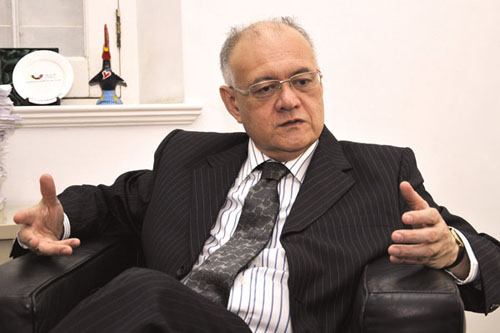Mr. José Luis de Sales Marques on Macau, China and Europe

Mr. José Luis de Sales Marques is President of the Institute of European Studies of Macau (IEEM).
Q: Is IEEM the only organization in Macau to work on European affairs? IEEM has achieved great success in promoting mutual understanding between the two sides. Can you please say a few words about IEEM?
A: IEEM is a non-profit association, with six members: Macau SAR Government, Macau Foundation, Macau Trade and Promotion Institute, Macau Monetary Authority, University of Macau and Macau Polytechnic Institute. It was founded in 1997, after Macau and EU signed a Trade and Economic Cooperation Agreement effective since 1993. It has been in effect for 20th years.
IEEM is not the only organization in Macau to work on European Affairs. The University of Macau (UMAC), for instance, is offering a master program in International and EU law for many years. Some other EU related programs are about to come out, too, integrated in the EU Academic Program (EUAP), which is supported by EU and has UMAC and IEEM as local partners.
However, IEEM is, by far, the institution that has a most comprehensive program and track record in working with Europe in promoting academic and cultural exchanges. We have as our core activity teaching and research on EU integration, its various dimensions, with particular interest in EU’s external policies and relations.
Moreover, we go farther than most EU related programs, since we also cover the legal, social and economic dimensions of the EU. We are not limited or restricted to academic only programs. We do a lot of outreach, promoting dialogue between Macau and EU as well as between Sino-Western Culture and arts. We also have programs concerning urban issues and sustainable architecture. IEEM is also involved in Business related initiatives.
Q: Apart from Portugal, which European countries have close contacts with Macau and in what areas?
A: Macau’s biggest European partners are Germany, France, UK and Italy. Macau is a growing market for the EU and our bilateral trade is in deficit, favoring the EU.
Q: In your view, what is the biggest obstacle between the relations between Macau and Europe?
A: There are very institutional and government-to-government relations, but this strength is also the biggest limitation to our current relations. EU-Macau relation is top-down and there is still a lot of potential for further developments, in almost every dimension: economic, technology, environment, urban issues, culture and education, etc.
Q: What do you think of the bilateral relations between Europe and China? What are the problems?
A: Three major deficits: Knowledge, Communication and Trust.
Q: How to deal with these problems?
A: More interaction at every level, including people-to-people relation, is needed to reduce the existing physical, psychological and cultural distances separating the two sides of Eurasia. It would be very important if younger generations of both sides travel across the other side to learn the language, experience the life and culture of the “other”. It will not solve all problems, which are rooted in ideological and political differences, but will certainly invite each side to listen to the other, much more than they are doing now, and find a way to live together.
Q: What kind of role can Macau play in deepening mutual understanding between China and Europe?
A: Macau has been for centuries a go-between for China and the West. It is in our DNA. It can help exactly in the way we can approach two sides, create dialogue opportunities, promote academic and cultural exchanges, build Macau’s capacity and improve our skills to be a place for Europe and China to meet.
- Back _articles: Javier Solana on European Debt Crisis and China-EU Relations
- Next _articles: Prof. Zhang Yong'an on China-European Economic Relations